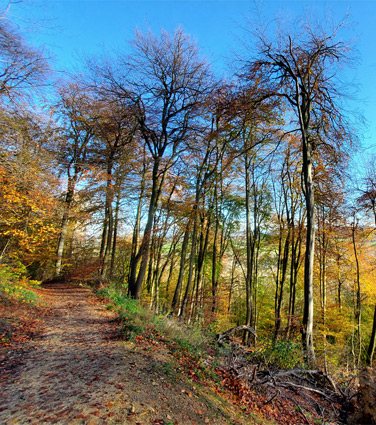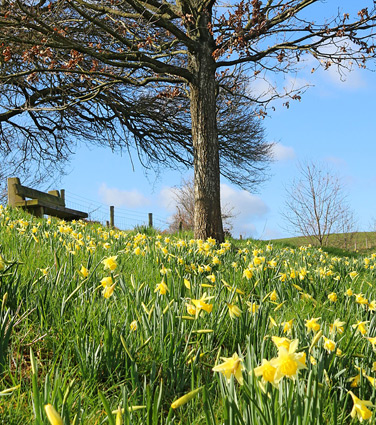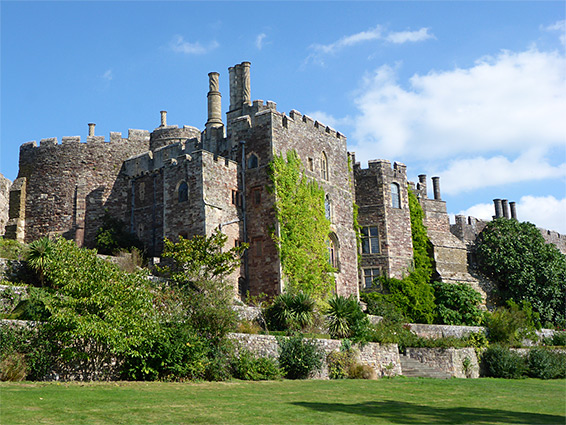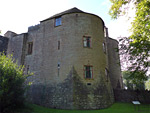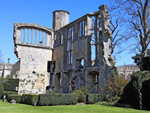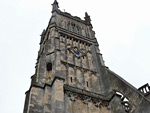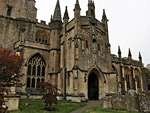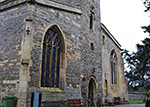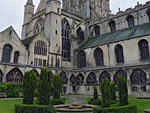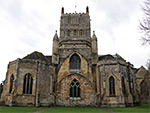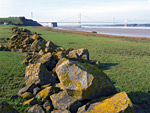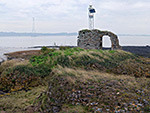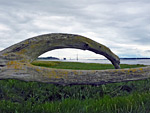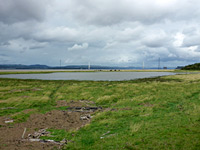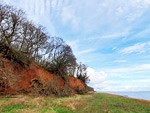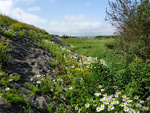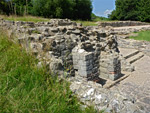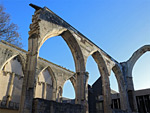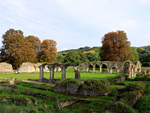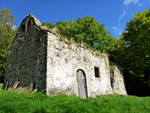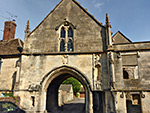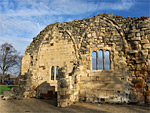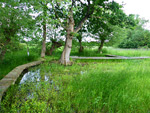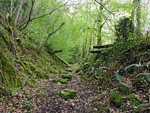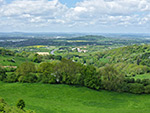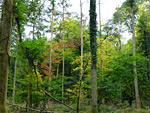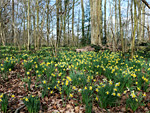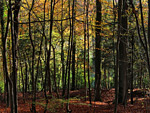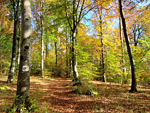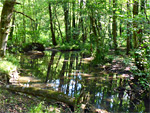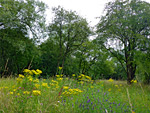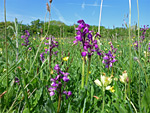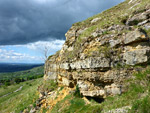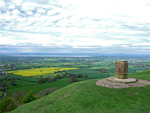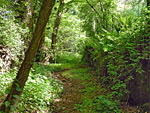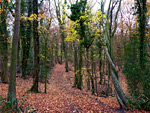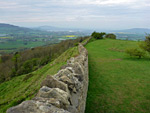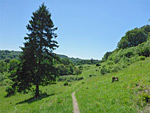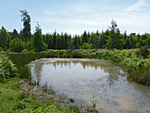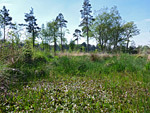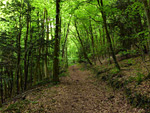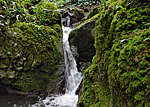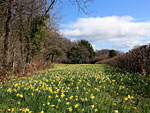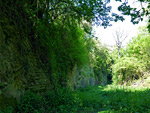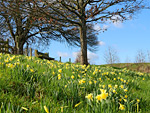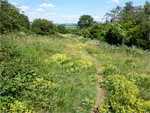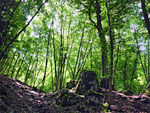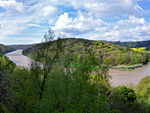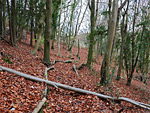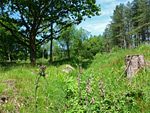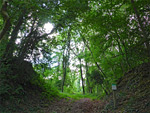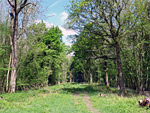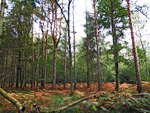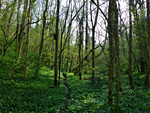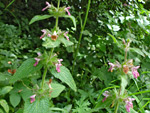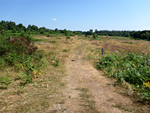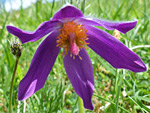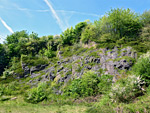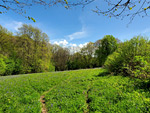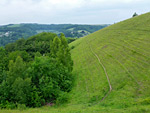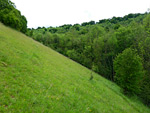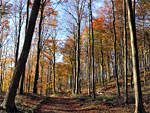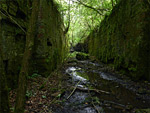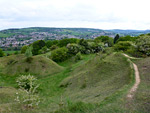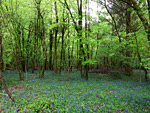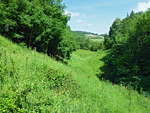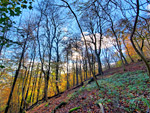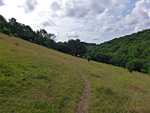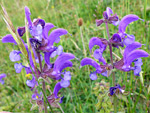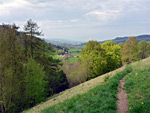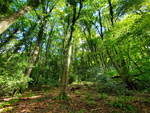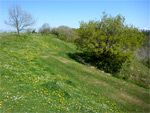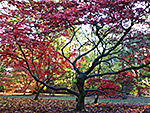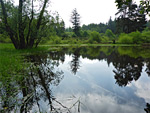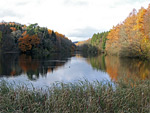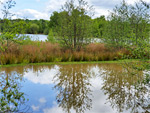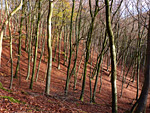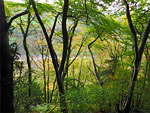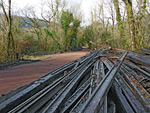Gloucestershire (including the unitary authority of South Gloucestershire) extends from north Bristol in the south to Tewkesbury in the north, and from the River Wye in the west, bordering Wales, to the Cotswolds in the east. Major geographic areas include the eastern half of the Wye Valley, the Forest of Dean, the Vale of Berkeley alongside the River Severn, and, the largest, the Cotswolds themselves, over half of which is within this county.
There are no outstandingly scenic places and no truly wild, undeveloped areas, but plenty of pleasant landscapes, of rolling hills, riparian valleys, ancient woodlands, and estuarine environments along the River Severn. The river becomes a sea around the village of Severn Beach, near the southwest corner of Gloucestershire, though the riversides are coastal in appearance for up to ten miles upstream, however most is bordered by mud flats and grassland, with just a few more photogenic, rocky places such as the cliffs at Aust. Over 60 sites in Gloucestershire are protected as nature reserves, and about half of these contain scenic landscapes in addition to the interesting flora and fauna.
Notable ancient sites are somewhat fewer in number than for adjacent counties like Somerset and Monmouthshire. There are plenty of country houses, still used as residences, and three major medieval churches, at Cirencester, Gloucester and Tewkesbury, together with many smaller religious buildings. Perhaps the best of the small number of ruined places is Hailes Abbey near Winchcombe; nearly all of the other monastic buildings from this period have been incorporated into current buildings, or are no longer visible. Similarly, of the 30 or so castles in the county, all are either completely disappeared, evident only from low earthworks, or are intact and still occupied; Berkeley Castle is the most famous location.
There are no outstandingly scenic places and no truly wild, undeveloped areas, but plenty of pleasant landscapes, of rolling hills, riparian valleys, ancient woodlands, and estuarine environments along the River Severn. The river becomes a sea around the village of Severn Beach, near the southwest corner of Gloucestershire, though the riversides are coastal in appearance for up to ten miles upstream, however most is bordered by mud flats and grassland, with just a few more photogenic, rocky places such as the cliffs at Aust. Over 60 sites in Gloucestershire are protected as nature reserves, and about half of these contain scenic landscapes in addition to the interesting flora and fauna.
Notable ancient sites are somewhat fewer in number than for adjacent counties like Somerset and Monmouthshire. There are plenty of country houses, still used as residences, and three major medieval churches, at Cirencester, Gloucester and Tewkesbury, together with many smaller religious buildings. Perhaps the best of the small number of ruined places is Hailes Abbey near Winchcombe; nearly all of the other monastic buildings from this period have been incorporated into current buildings, or are no longer visible. Similarly, of the 30 or so castles in the county, all are either completely disappeared, evident only from low earthworks, or are intact and still occupied; Berkeley Castle is the most famous location.
CastlesBeverston Castle - also known as Tetbury Castle, this is a privately owned structure in the Cotswolds, built in the 13th century. Part is ruined, while other sections have been incorporated into a modern residence |
| Berkeley Castle The third oldest continuously occupied castle in England, after Windsor Castle and the Tower of London; home of the Berkeley family since the early 12th century Rating: ★★★★★ |
| St Briavels Castle Constructed in the 12th century, near the Forest of Dean. Some buildings are intact, and used as a youth hostel, while the public can visit the ruined areas Rating: ★★★★★ |
| Sudeley Castle Privately-owned fortified mansion built in the 1440s, with extensive gardens and some ruined components; open to visitors Rating: ★★★★★ |
| Thornbury Castle - a manor house rather than a true castle, this was built in the early 16th century then later extensively altered. It is now a hotel |
Cathedrals, and other major churchesChurch of St John Baptist, Cirencester One of the largest parish churches in the country, some parts dating from the 12th century. Impressive perpendicular gothic architecture Rating: ★★★★★ |
| Church of St Peter and St Paul, Northleach Cathedral-like parish church, mostly dating from the 14th century, noted for its collection of early brasses Rating: ★★★★★ |
| Deerhurst Priory One of the oldest parish churches in the country, the central section dating from the start of the 9th century Rating: ★★★★★ |
| Gloucester Cathedral Imposing, city centre Norman cathedral with many fine architectural features. Contains the tomb of Edward II Rating: ★★★★★ |
| Tewkesbury Abbey Large Norman church, 'the cathedral of the Cotswolds', famous for its well-preserved Gothic architecture Rating: ★★★★★ |
CoastlinesAust to Littleton Pill Partly cliff-lined, fossiliferous section of the Severn Estuary, either side of the original motorway bridge Rating: ★★★★★ |
| Beachley Point and Chapel Rock Low cliffs at the tip of the peninsula between the rivers Wye and Severn, and a tidal island centred on a ruined medieval chapel Rating: ★★★★★ |
| Littleton Pill to Oldbury Pill 1.3 mile stretch of flat land beside the Severn Estuary, between two road access points, a good location for saltmarsh plants Rating: ★★★★★ |
| Pilning to Aust Three miles of the Severn Estuary coastline, lined by saltmarsh, including the Pilning Wetlands, a series of artificially-created pools Rating: ★★★★★ |
| Sedbury Cliff Wooded slopes of grey and red mudstone above a narrow beach bordering the River Severn Rating: ★★★★★ |
| Severn Beach to Avonmouth Three miles of flat Severn Estuary coastline, mainly saltmarsh with some sand and shingle; good for wildflowers Rating: ★★★★★ |
Roman SitesGreat Witcombe Roman Villa Excavated foundations of a substantial Roman villa, inhabited up to the 5th century, and rediscovered in 1818 Rating: ★★★★★ |
Ruined Abbeys, and other disused religious buildingsGreyfriars, Gloucester Walls, windows and arches from the church of a medieval friary, founded around 1231 and rebuilt in 1531 Rating: ★★★★★ |
| Hailes Abbey Limited but atmospheric and picturesque ruins of a Cistercian monastery; arches of the cloisters, and foundations of other buildings Rating: ★★★★★ |
| St James' Church Ruins of a small church in the Wye Valley, the only remnant from the medieval village of Lancaut Rating: ★★★★★ |
| Kingswood Abbey Gatehouse Intact gatehouse of a Cistercian monastery, the remainder having been completely demolished Rating: ★★★★★ |
| Odda's Chapel - small but nearly complete Saxon chapel, constructed in 1056 |
| St Oswald's Priory Fragmentary but evocative remains of an ancient priory, near the centre of Gloucester Rating: ★★★★★ |
LandscapesBadgeworth Nature Reserve Small pond home to aquatic plant species, including the very rare adder's-tongue spearwort, or Badgeworth buttercup Rating: ★★★★★ |
| Ban-y-Gor Woods Nature Reserve Cool, shady, moist woodland below a steep slope on the east bank of the River Wye, crossed by a 0.7 mile path Rating: ★★★★★ |
| Barrow Wake Nature Reserve Steep-sided limestone hill along the edge of the Cotswolds, with fine westwards views and over 100 plant species Rating: ★★★★★ |
| Beechenhurst Trail Nine mile loop through varied, mature woodland in the northwest section of the Forest of Dean, including Worgreens Lake and the Cannop Ponds Rating: ★★★★★ |
| Betty Daw's Wood Semi-natural woodland filled with thousands of daffodil flowers in the spring; part of the 'Golden Triangle' of wild daffodil colonies Rating: ★★★★★ |
| Box Wood Nature Reserve Ancient woodland, including beech trees, along both sides of a narrow valley centred on a small, spring-fed stream, the upper end of which forms waterfalls and cascades Rating: ★★★★★ |
| Buckholt Wood Ancient woodland in the Cotswolds, mainly beech, across south-facing slopes; dry above, springs and streams below Rating: ★★★★★ |
| Cannop Bridge Marsh Nature Reserve Pools, streams and marshy woodland in the Forest of Dean, at the edge of the open water of North Cannop Pond Rating: ★★★★★ |
| Charfield Meadow Nature Reserve Undisturbed grassland and woodland beside the Bristol-Birmingham railway line, supporting a wide range of plant species Rating: ★★★★★ |
| Clarke's Pool Nature Reserve Two fields of semi-natural pasture filled with abundant wildflowers in the spring and summer, including thousands of green-winged orchids Rating: ★★★★★ |
| Cleeve Common Large expanse of floral, calcareous grassland, including the highest point in the Cotswolds Rating: ★★★★★ |
| Coaley Peak Nature Reserve High point along the west edge of the Cotswolds, with views to the Severn valley. Also site of a prehistoric burial chamber Rating: ★★★★★ |
| Collin Park Wood Nature Reserve Semi-natural, ancient woodland, on acidic, clayish ground beside the floodplain of the River Leadon Rating: ★★★★★ |
| Coopers Hill Nature Reserve Sizeable area of ancient beech woodland at the edge of the Cotswolds, overlooking the Severn Vale Rating: ★★★★★ |
| Crickley Hill Nature Reserve Prominent limestone hill at the edge of the Cotswolds, overlooking Gloucester and the Severn valley; a noted wildflower location, plus old quarries and the remains of an Iron Age hillfort Rating: ★★★★★ |
| Daneway Banks Nature Reserve Sloping calcareous grassland plus scrub and patches of trees, supporting a wide variety of plant species; in a quiet part of the Cotswolds Rating: ★★★★★ |
| Edgehills Bog Nature Reserve Remote nature reserve; pools and boggy land on a ridgetop on the east side of the Forest of Dean, home to a variety of heath-specific plants Rating: ★★★★★ |
| Foxes Bridge Bog Nature Reserve Acid bog on high ground in the middle of the Forest of Dean, enclosed by oak woodland Rating: ★★★★★ |
| Frith Wood Nature Reserve Ancient beech woodland on two sides of a ridge in the Cotswold Hills near Stroud Rating: ★★★★★ |
| Grandmother's Rock Enclosed stream with waterfall, and an old quarry, surrounded by shady woodland Rating: ★★★★★ |
| Gwen and Vera's Fields Nature Reserve Two small fields filled with wild daffodils in the spring, and a selection of other wildflowers Rating: ★★★★★ |
| Hobbs Quarry Nature Reserve Overgrown limestone quarry, with interesting geological exposures; colonised by a variety of woodland plants Rating: ★★★★★ |
| Ketford Bank Nature Reserve Wild daffodils and bluebells in a field of sloping grassland, on a north-facing hillside above the valley of the River Leadon Rating: ★★★★★ |
| Kilkenny Nature Reserve Sloping enclosure of unimproved calcareous grassland in the Cotswolds, containing many wildflower species Rating: ★★★★★ |
| Lady Park Wood National Nature Reserve Ancient, broad-leaved woodland across a northeast-facing slope in the Wye Valley, with several rare plant species Rating: ★★★★★ |
| Lancaut Nature Reserve Limestone cliffs and steeply-sloping woodland along the valley of the River Wye; home to over 350 plant species Rating: ★★★★★ |
| Laurie Lee Wood Nature Reserve Small patch of ancient woodland across a steep, north-facing slope above the valley of Slad Brook Rating: ★★★★★ |
| Laymoor Quag Nature Reserve Boggy heath, woodland, grassland and ponds near Cinderford at the edge of the Forest of Dean, crossed by old railway lines Rating: ★★★★★ |
| Lippets Grove Nature Reserve Small, rather remote patch of ancient woodland above the River Wye, beside Offa's Dyke, containing varied wildflowers Rating: ★★★★★ |
| Lower Woods Nature Reserve One of the largest areas of ancient woodland in south England; a group of over 20 small, adjoining woods, separated by broad, grassy tracks Rating: ★★★★★ |
| Michael Wood Elevated area of mixed broadleaf and coniferous trees on an ancient woodland site; a particularly good location for fungi Rating: ★★★★★ |
| Midger Wood Nature Reserve Belt of ancient woodland in a narrow valley containing a tufa-lined stream, flowing over small waterfalls Rating: ★★★★★ |
| Old London Road Nature Reserve Small, narrow field at the edge of the Cotswolds, one of only two UK locations for limestone woundwort, a very rare plant Rating: ★★★★★ |
| Painswick Beacon Grassy summit in the Cotswolds, part of the western escarpment, also site of an Iron Age hillfort Rating: ★★★★★ |
| The Park and Poor's Allotment Sizeable nature reserve containing acidic heathland, either side of the B4228 near the River Wye Rating: ★★★★★ |
| Pasqueflower SSSI Rare wildflowers in a peaceful, grassy valley in the Cotswold Hills; also contains orchids in addition to the pasqueflower, which blooms in April and May Rating: ★★★★★ |
| Plump Hill Dolomite Quarry Varied wildflowers in an abandoned quarry at the edge of the Forest of Dean Rating: ★★★★★ |
| Ridley Bottom Three floral meadows and a patch of ancient bluebell woodland Rating: ★★★★★ |
| Rodborough Common Large expanse of calcareous grassland in the Cotswolds, southeast of Stroud Rating: ★★★★★ |
| Rough Bank Sloping grassland above a narrow valley in the Cotswolds, home to many species of butterflies and plants Rating: ★★★★★ |
| Saltridge Wood Mature beech woodland on the slopes above Painswick Valley, part of Cotswold Commons and Beechwoods National Nature Reserve Rating: ★★★★★ |
| Sapperton Valley Nature Reserve Woodland and wet meadows along the River Frome, incorporating a disused section of the Severn and Thames Canal Rating: ★★★★★ |
| Selsley Common Limestone grassland, flat or steeply sloping, along the west edge of the Cotswold escarpment, south of Stroud Rating: ★★★★★ |
| Siccaridge Wood Nature Reserve Ancient coppiced woodland, on sloping ground above the disused Severn-Thames Canal; several rare wildflower species Rating: ★★★★★ |
| Stenders Quarry Nature Reserve Small limestone quarry, abandoned for nearly a century, now colonised by a good variety of plant species Rating: ★★★★★ |
| Stinchcombe Hill Promontory at the west edge of the Cotswolds; calcareous grassland on top, and oak/ash/beech woods around the perimeter Rating: ★★★★★ |
| Strawberry Banks SSSI Two grassy fields above a small valley, sloping down to a stream, a tributary of the River Frome Rating: ★★★★★ |
| Stuart Fawkes Gently sloping pasture on calcareous soils, with a selection of common wildflowers and one very rare species, meadow clary Rating: ★★★★★ |
| Swift's Hill Nature Reserve Hillside nature reserve; a noted location for wildflowers, including 15 species of orchid Rating: ★★★★★ |
| The Hudnalls National Nature Reserve Ancient woodland of beech, oak, ash and lime, on acidic soils across a steep, west-facing slope above the River Wye Rating: ★★★★★ |
| Uley Bury Detached part of the Cotswold escarpment; a flat-topped limestone hill, site of a large Iron Age fort Rating: ★★★★★ |
| Westonbirt Arboretum Collection of 2,500 species of trees and shrubs from around the world, mixed with a sizeable area of ancient, natural woodland Rating: ★★★★★ |
| Wigpool Nature Reserve Ponds, marsh and acidic heath, in the middle of a conifer plantation near the north edge of the Forest of Dean Rating: ★★★★★ |
| Woodchester Park Hidden valley in the Cotswolds, containing an unfinished mansion, a chain of lakes, grassy slopes and extensive woodland Rating: ★★★★★ |
| Woorgreens Lake Nature Reserve Shallow lake ringed by woodland and heath, at the centre of the Forest of Dean. Formerly an opencast iron mine Rating: ★★★★★ |
| Workmans Wood Mature beech woodland on steep-slopes in the upper Painswick Valley, part of Cotswold Commons and Beechwoods National Nature Reserve Rating: ★★★★★ |
| Wye Valley: Passage Grove and Caswell Wood Ancient woodland, an old railway, a tufa stream, the river and views of Tintern Abbey Rating: ★★★★★ |
| Wye Valley: Tidenham Chase Varied scenery along a loop walk in the Wye Valley, including a disused quarry, an old railway, a cave and an abandoned ferry Rating: ★★★★★ |
